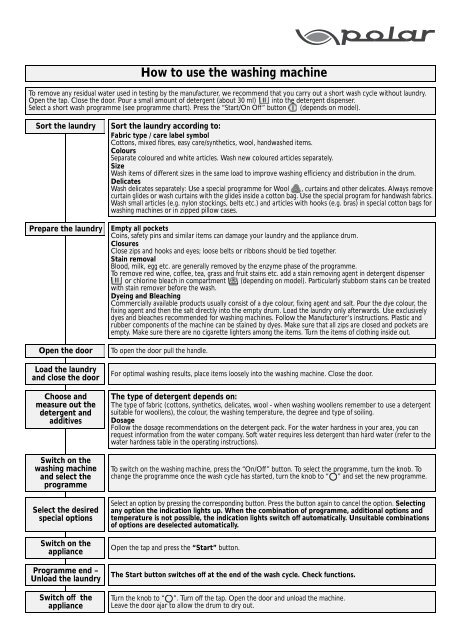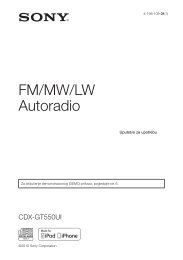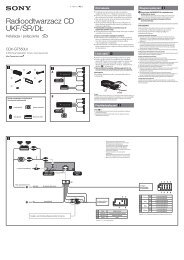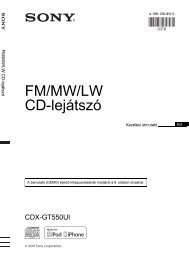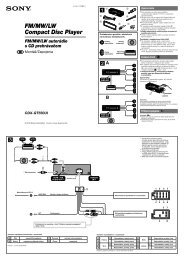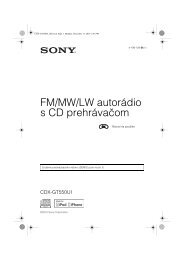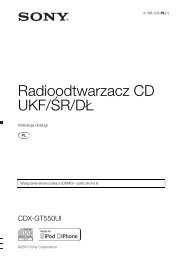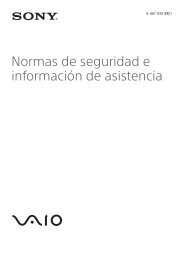KitchenAid PDP 819/P - PDP 819/P EN (858042149600) Scheda programmi
KitchenAid PDP 819/P - PDP 819/P EN (858042149600) Scheda programmi
KitchenAid PDP 819/P - PDP 819/P EN (858042149600) Scheda programmi
You also want an ePaper? Increase the reach of your titles
YUMPU automatically turns print PDFs into web optimized ePapers that Google loves.
How to use the washing machine<br />
To remove any residual water used in testing by the manufacturer, we recommend that you carry out a short wash cycle without laundry.<br />
Open the tap. Close the door. Pour a small amount of detergent (about 30 ml) into the detergent dispenser.<br />
Select a short wash programme (see programme chart). Press the “Start/On Off” button (depends on model).<br />
Sort the laundry<br />
Prepare the laundry<br />
Open the door<br />
Load the laundry<br />
and close the door<br />
Choose and<br />
measure out the<br />
detergent and<br />
additives<br />
Switch on the<br />
washing machine<br />
and select the<br />
programme<br />
Select the desired<br />
special options<br />
Switch on the<br />
appliance<br />
Programme end –<br />
Unload the laundry<br />
Switch off the<br />
appliance<br />
Sort the laundry according to:<br />
Fabric type / care label symbol<br />
Cottons, mixed fibres, easy care/synthetics, wool, handwashed items.<br />
Colours<br />
Separate coloured and white articles. Wash new coloured articles separately.<br />
Size<br />
Wash items of different sizes in the same load to improve washing efficiency and distribution in the drum.<br />
Delicates<br />
Wash delicates separately: Use a special programme for Wool , curtains and other delicates. Always remove<br />
curtain glides or wash curtains with the glides inside a cotton bag. Use the special program for handwash fabrics.<br />
Wash small articles (e.g. nylon stockings, belts etc.) and articles with hooks (e.g. bras) in special cotton bags for<br />
washing machines or in zipped pillow cases.<br />
Empty all pockets<br />
Coins, safety pins and similar items can damage your laundry and the appliance drum.<br />
Closures<br />
Close zips and hooks and eyes; loose belts or ribbons should be tied together.<br />
Stain removal<br />
Blood, milk, egg etc. are generally removed by the enzyme phase of the programme.<br />
To remove red wine, coffee, tea, grass and fruit stains etc. add a stain removing agent in detergent dispenser<br />
or chlorine bleach in compartment (depending on model). Particularly stubborn stains can be treated<br />
with stain remover before the wash.<br />
Dyeing and Bleaching<br />
Commercially available products usually consist of a dye colour, fixing agent and salt. Pour the dye colour, the<br />
fixing agent and then the salt directly into the empty drum. Load the laundry only afterwards. Use exclusively<br />
dyes and bleaches recommended for washing machines. Follow the Manufacturer’s instructions. Plastic and<br />
rubber components of the machine can be stained by dyes. Make sure that all zips are closed and pockets are<br />
empty. Make sure there are no cigarette lighters among the items. Turn the items of clothing inside out.<br />
To open the door pull the handle.<br />
For optimal washing results, place items loosely into the washing machine. Close the door.<br />
The type of detergent depends on:<br />
The type of fabric (cottons, synthetics, delicates, wool - when washing woollens remember to use a detergent<br />
suitable for woollens), the colour, the washing temperature, the degree and type of soiling.<br />
Dosage<br />
Follow the dosage recommendations on the detergent pack. For the water hardness in your area, you can<br />
request information from the water company. Soft water requires less detergent than hard water (refer to the<br />
water hardness table in the operating instructions).<br />
To switch on the washing machine, press the “On/Off” button. To select the programme, turn the knob. To<br />
change the programme once the wash cycle has started, turn the knob to “ ” and set the new programme.<br />
Select an option by pressing the corresponding button. Press the button again to cancel the option. Selecting<br />
any option the indication lights up. When the combination of programme, additional options and<br />
temperature is not possible, the indication lights switch off automatically. Unsuitable combinations<br />
of options are deselected automatically.<br />
Open the tap and press the “Start” button.<br />
The Start button switches off at the end of the wash cycle. Check functions.<br />
Turn the knob to “ ”. Turn off the tap. Open the door and unload the machine.<br />
Leave the door ajar to allow the drum to dry out.
Programme table Detergent and additives Options<br />
Programme<br />
Care<br />
Labels<br />
Type of wash<br />
Load<br />
kg<br />
Fabric<br />
Softener<br />
Main Wash<br />
Prewash<br />
Prewash<br />
Intensive<br />
rinse<br />
Max. speed<br />
Spin<br />
Cotton<br />
90°,<br />
75°, 60° *, 40°, 30°<br />
Averagely to lightly soiled cottons, bed linen, table linen,<br />
underwear, towels, shirts, etc.<br />
For heavily soiled loads the “Prewash“ option can also be selected.<br />
5.0 ❉ Yes ❉ ❉ ❉ 800<br />
Synthetic<br />
60°, 50°, 40°, 30°<br />
Slightly to normally soiled blouses, shirts, overalls etc. made of<br />
polyester (Diolen, Trevira), polyamide (Perlon, Nylon) or<br />
blends with cotton.<br />
For heavily soiled loads the “Prewash“ option can also be selected.<br />
2.5 ❉ Yes ❉ ❉ ❉ 800<br />
Daily<br />
40°<br />
Slightly to normally soiled textiles made of cotton and/or<br />
synthetics.<br />
3.0 ❉ Yes — — — 500<br />
Delicate<br />
30°,<br />
Curtains and delicate clothing, dresses skirts, shirts and<br />
blouses.<br />
“Intensive Rinse” is not possible in this programme.<br />
1.5 ❉ Yes — — — 500<br />
Wool<br />
40° **, 30°,<br />
Only machine washable woollens with pure new wool label. 1.0 ❉ Yes — — — 800<br />
Handwash<br />
Textiles made of linen, silk, wool and viscose marked as<br />
“handwashable”.<br />
2.0 ❉ Yes — — — 800<br />
Rapid<br />
wash<br />
40°<br />
—<br />
Averagely to lightly soiled cottons, bed linen, table linen,<br />
underwear, towels, shirts, etc.<br />
3.5 ❉ Yes — — — 800<br />
Rinse<br />
Drain/<br />
Spin<br />
— To rinse and refresh laundry. 5.0 ❉ — — — — 800<br />
— Drain and spin. — — — — — — 800<br />
* Programmes in conformity with <strong>EN</strong> 60456.<br />
** The wool wash cycle of this machine has been approved by Woolmark for the washing of machine washable Woolmark products provided that the garments are washed<br />
according to the instructions on the garment label and those issued by the manufacturer of this washing machine. M0402-M0403-M0404-M0405.
What to do if...<br />
...The appliance will not<br />
start, the Start button<br />
is not blinking:<br />
...The appliance will not<br />
start, but the Start<br />
button is blinking:<br />
...No water supply:<br />
...Waste water not<br />
pumped out:<br />
...Detergent and<br />
additive product<br />
residues in detergent<br />
drawer at end of wash:<br />
...Machine vibrates<br />
during spin cycle:<br />
...Final spin results are<br />
poor:<br />
Check<br />
whether:<br />
Check<br />
whether:<br />
Check<br />
whether:<br />
Check<br />
whether:<br />
Check<br />
whether:<br />
Check<br />
whether:<br />
Check<br />
whether:<br />
• The appliance is plugged in.<br />
• The wall socket is functioning correctly (use a table lamp or similar).<br />
• The appliance door is properly closed.<br />
• A programme has been selected.<br />
• The water tap is open. If not, open the tap and press the Start button.<br />
• The tap is turned on completely.<br />
• Kinks are present in water hose.<br />
• The water hose filter is clogged.<br />
• The water hose is frozen up.<br />
• The drain hose is correctly installed (see “Installation Instructions” in the<br />
Instructions Manual.<br />
• The filter is clogged.<br />
• The drain hose is frozen up.<br />
• The siphon is correctly installed and clean (see “Care and Maintenance” in the<br />
Instructions Manual).<br />
• Enough water is being supplied. The mesh filters between the inlet hose and<br />
the tap could be clogged (see “Care and Maintenance” in the Instructions<br />
manual); check and clean the filter two or three times a year (see “Removing<br />
the filter” in the Instructions Manual).<br />
Note:<br />
Too much detergent can result in excess foam formation, which reduces washing<br />
efficiency. If the appliance detects excessive foam it may prevent spinning.<br />
Insufficient detergent may result in grey laundry, deposits on the drum, tub and<br />
heater. To prevent dispensing problems when using highly concentrated powder<br />
and liquid detergents, use the special detergent ball or bag supplied with the<br />
detergent and place it inside the drum.<br />
Whitish residues on dark fabrics are caused by insoluble compounds used in<br />
modern phosphate-free powder detergents. If this occurs, shake or brush out<br />
the fabric or use liquid detergents.<br />
Keep detergents and additives in a dry place and out of reach of children.<br />
Use only detergents and additives specifically produced for domestic washing machines.<br />
If you use descaling agents, dyes or bleaches, make sure they are suitable for<br />
washing machine use. Descaler could contain components that can attack parts<br />
of your washing machine.<br />
Do not use any solvents (e.g. turpentine, benzine, etc.). Do not machine wash<br />
fabrics that have been treated with solvents or flammable liquids.<br />
• The machine is perfectly horizontal with all four feet on ground<br />
(see “Installation” in the Instructions Manual).<br />
• The transit bolts have been removed. The transit bolts must be removed<br />
before the appliance can be used (see “Installation” in the Instructions manual).<br />
The appliance has an imbalance detection and correction system. If individual<br />
heavy articles are loaded (bathmat, bathrobe, etc.) this system may reduce the<br />
spin speed automatically to protect the appliance or even interrupt the spin cycle<br />
altogether, if the imbalance is too great even after several spin starts.<br />
• If the laundry is still too wet at the end of the cycle, add smaller articles of<br />
laundry and repeat the spin cycle.<br />
• Excessive foam formation may also prevent spinning. Ensure correct amount of<br />
detergent is used.<br />
AFTER SALES SERVICE<br />
If, after carrying out the above checks, the malfunction persists or appears again, turn the appliance off and call our After-Sales Service (see<br />
guarantee).<br />
Specify:<br />
• The nature of the problem<br />
• The type and model of washing machine<br />
• The service code (the number after the<br />
word Service). The After-Sales Service<br />
sticker is on the right side of the open door.
Please read the Instructions Manual carefully before using your new washing machine<br />
Quick Reference Guide<br />
GB<br />
Programme selector<br />
To select a programme, turn the knob.<br />
To change the programme once the wash cycle has<br />
started, turn the knob to “ ” and set the new<br />
programme.<br />
Start button<br />
When you press this button, it lights up and the wash<br />
cycle starts. At the end of the wash cycle the light will<br />
turn off.<br />
On/Off button<br />
This button switches the washing machine on/off.<br />
Spin speed selector knob<br />
Turn the spin speed selector knob to the desired spin<br />
speed. If the spin speed “ ” is selected, the final spin<br />
is cancelled, but not the intermediate spins. The<br />
programme ends with a drain cycle.<br />
Changing or interrupting the programme during the wash cycle<br />
Turn the programme selector to the “ ” position.<br />
Select the new programme (with temperature), any options and<br />
another spin speed if you want.<br />
Press the “Start” button again. If the “On/Off” button is pressed, no<br />
detergent has to added.<br />
Cancelling a programme before the end<br />
Turn the programme selector to the “ ” position.<br />
Set the programme selector to programme setting “Drain/Spin.<br />
Press the “Start” button to start the “Drain/Spin” cycle.<br />
Options<br />
Selecting any option the indication lights up .<br />
When the combination of programme, additional options and<br />
temperature is not possible, the indication lights switch off<br />
automatically. Unsuitable combinations of options are deselected<br />
automatically.<br />
Prewash<br />
Only for heavily soiled laundry (e.g. sand, granular<br />
dirt). Programmes with Prewash last approx. 15<br />
minutes longer.<br />
Intensive rinse<br />
More water and a longer time in rinse cycle is added.<br />
The intensive rinse function is especially suitable for<br />
areas with particularly soft water, for baby clothes<br />
and to help people with allergies.<br />
Programme<br />
Temperature<br />
selector<br />
(°C)<br />
Whirlpool is a registered trademark of Whirlpool USA<br />
Power and water consumption data<br />
Load Water Energy Programme<br />
Duration<br />
approx.<br />
(kg) (l) (kWh) (hours : minutes)*<br />
Cotton 90 5.0 55** 1.80 2:10<br />
Cotton 60 5.0 50 0.95 2:12<br />
Cotton 40 5.0 50 0.50 1:59<br />
Synthetics 60 2.5 46 0.77 1:32<br />
Synthetics 40 2.5 46 0.40 1:30<br />
Synthetics short 30 2.0 27 0.33 0:41<br />
Delicate 30 1.5 52 0.41 0:53<br />
Wool 40 1.0 50 0.36 0:52<br />
Handwash 30 2.0 54 0.29 0:59<br />
Prewash cycle increases programme duration<br />
by approx. 15 minutes. Consumption values<br />
were measured in normalized conditions in<br />
compliance with Standard IEC 60 456.<br />
Consumption data in the home may vary with<br />
respect to the values in the table in relation to<br />
the water supply pressure and temperature,<br />
the load and the type of wash.<br />
* The remaining time display may differ from<br />
the values given in the table since it<br />
depends on the conditions of use in the<br />
home.<br />
** To reduce the water temperature, some<br />
cold water is added at the end of the main<br />
wash cycle, before the pump drains the<br />
water out.<br />
5019 801 20012<br />
(We reserve the right to make technical modifications)<br />
461306432


